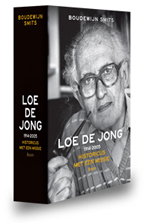Loe de Jong biography appears on historian’s 100th birthday

A self-willed man, unswayed by criticism. A man with a definite mission. This is the picture painted by the biography of historian Loe de Jong, for which Boudewijn Smits will be awarded a PhD by the University of Groningen on 24 April, to coincide with what would have been De Jong’s one hundredth birthday.
Dr Loe de Jong is mainly known for the thirteen-part series Het Koninkrijk der Nederlanden in de Tweede Wereldoorlog, a 16,800-page tome about the Netherlands in the Second World War, published in 27 volumes. This unparalleled achievement makes him the most illustrious, most productive and highest earning Dutch historian of all times. He was also director of the Netherlands State Institute for War Documentation from 1945 to 1979, and became a Dutch household name thanks to his television series De Bezetting (The Occupation), which was broadcast between 1960 and 1965. Boudewijn Smits has written a thesis based on material from countless archives, correspondence and conversations with his peers, in which he manages to sketch a lively portrait of Loe de Jong the man, organiser, historian and media figure.
National Security Office file
Loe de Jong is an icon of Dutch history and historiography. Although a great deal has already been said and written about him, Smits thinks that there is still room for a biography. ‘Nobody has explored the combination of his life and work with such intensity, using so many sources. I was even able to trace a file kept on him by the National Security Office (BVD). De Jong was shadowed from 1948 after being mistakenly suspected of having communist sympathies. I was also given exclusive access to De Jong’s personal archive in the Netherlands State Institute for War Documentation (NIOD), a source that has never been consulted before,’ continues the biographer. ‘It contains unique correspondence with his persecuted Jewish family in the Netherlands.’ Smits spoke to more than a hundred people who had known De Jong and with the journalists who first reported De Jong’s secret investigation into Aantjes. In November 1978, the then-leader of the Christian Democratic Alliance fell from power after De Jong’s revelations about his war years. ‘This was an episode that seriously damaged De Jong’s reputation,’ comments Smits.
Coming to terms
‘This biography is largely about how the Dutch people came to terms with the Second World War. De Jong’s authoritative television persona and his set opinions about the occupation brought him huge success in the television documentary series De Bezetting and his life’s work Het Koninkrijk,’ says Smits. ‘His account of oppression and resistance made a deep impression thanks to television, a new medium that was taking Europe by storm in the 1960s.’ But from 1965 on, the series became a thorn in the side of an up-and-coming generation of left-wing journalists. De Jong had reached the limits of what he could achieve in terms of fostering patriotic citizenship over reporting academic insights. ‘However, he still managed to find a way of holding the interest of the general public,’ according to Smits. ‘He enlarged upon the oppression-resistance contrast by adding the overarching theme of collaboration, thereby providing himself with academic justification for what he wrote and expounded in Het Koninkrijk.’
Righteous
‘Many of De Jong’s peers considered him a ‘scholar-under-restrictions,’ continues Smits, ‘vying for favour from the general public with his moralizing right/wrong opinions, at the expense of objective historiography.’ Smits adds this comment. ‘We must remember that De Jong’s genre of national historiography was characterized by a hard-won sense of democratic public responsibility and righteous patriotism that had been generated during the occupation.’
Biography Institute
De Jong’s biography will be published under the auspices of the Biography Institute of the University of Groningen, supervised by Prof. Hans Renders. The institute was founded to provide an academic basis for biography as a phenomenon, and aims to stimulate interpretive biographies that shed new light on history. The institute already boasts many acclaimed biographies, including those of J.C. Bloem and Helene Kröller-Müller. Biographies of Boudewijn Büch and Jelle Zijlstra are among current projects.
Curriculum Vitae
Boudewijn Smits studied History at the University of Groningen, where he now lectures in Modern History in the Faculty of Arts. His thesis is entitled Loe de Jong, 1914-2005. Historicus met een missie (Loe de Jong, 1914-2005. Historian with a mission) and his supervisors are Prof. J.W. Renders and Prof. J.C.H. Blom, former director of the Netherlands State Institute for War Documentation (NIOD).
More information
- See also www.biografieloedejong.nl
- The thesis will be published in a trade edition by Uitgeverij Boom.
| Last modified: | 10 September 2024 3.27 p.m. |
More news
-
01 April 2025
UGBS Executive MBA best-rated MBA | Dutch Master's Guide 2025
According to the independent Keuzegids Masters 2025, the Executive MBA of the University of Groningen Business School is the best rated MBA in the Netherlands (both part-time and full-time programmes).
-
01 April 2025
Executive Master of M&A and Valuation accredited as joint degree with Vrije Universiteit Amsterdam
Starting 1 September, participants enrolled in the programme will receive a master's degree from both the University of Groningen and Vrije Universiteit Amsterdam upon successful completion.
-
24 March 2025
UG 28th in World's Most International Universities 2025 rankings
The University of Groningen has been ranked 28th in the World's Most International Universities 2025 by Times Higher Education. With this, the UG leaves behind institutions such as MIT and Harvard. The 28th place marks an increase of five places: in...
